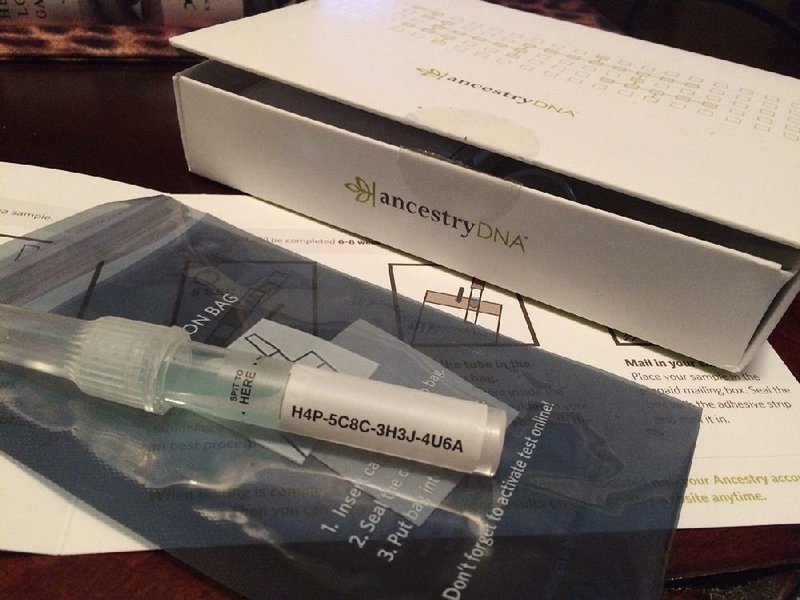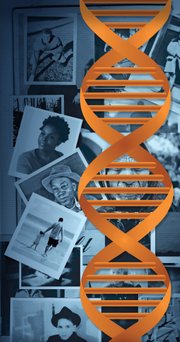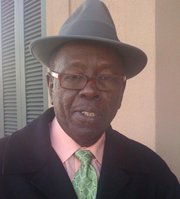Nancy Robinson Lott and her family have been tracing their history about a decade. As is the case in many families, genealogical rumors abounded.
They knew they were of African descent, says Lott, 65, of Little Rock, who's retired from public communications. But they assumed that these ancestors were only sub-Saharan ancestors from the Atlantic coasts, she adds. "And we knew there were some rumors of Irish."
For answers, Lott's family turned to DNA (deoxyribonucleic acid) testing, the newest trend in genealogy.
"DNA testing has become an accepted tool for identifying ancestors and for verifying genealogical leads," according to genealogical website Familysearch.org. "It is also used frequently to learn about our deep ancestry." It's also defined as genetic genealogy, described on Wikipedia.org as "the use of DNA testing in combination with ... traditional genealogical and historical records to infer relationships between individuals."
Lott's family has done DNA tests offered by a handful of companies. To find out more about the African heritage of the Robinsons, Lott's brother and sister utilized AfricanAncestry.com. In order to help customers trace their ancestry back more than 500 years to particular ethnic groups in Africa, the company offers a PatriClan (Y-chromosome) test, which can be taken only by men in a family, and a MatriClan (mitochondrial) test, which can be taken by both sexes. Whereas the MatriClan test linked Lott's maternal heritage to the Temne and Mende people of Sierra Leone, the PatriClan
DNA test revealed a connection to northern Africa, near Spain. DNA analysis of the family's European heritage revealed another couple of surprises: a somewhat higher percentage of European than originally thought, and a link to not only Ireland, but Scotland.
DOUBLE HELIXES THAT BIND
"It's very fascinating to see how fast the interest [in], and popularity" of, genealogical DNA testing has grown, says Anna Swayne, a DNA educator for Ancestry.com. Her company's $99 DNA kits show customers their ethnic/geographical ancestry mix by percentage, testing across 26 different regions and various populations to find a customer's match, and compares a particular customer's DNA to others in its database. Ancestry, which sells memberships that provide access to genealogical research documents, has offered DNA tests only for the last four years; however its database has doubled each year during that time, Swayne says.
Gina Paige, president of AfricanAncestry, says her company has also enjoyed a boon in customers since launching more than a decade ago. Founded by Paige and biologist Rick Kittles, the company charges $299 for its MatriClan and PatriClan tests.
Often, such DNA tests are used to confirm or debunk long-held family rumors, as shown in current Ancestry.com television commercials. Those tested can also find cousins who have also been tested. (The website GEDMatch.com, for instance, analyzes DNA data for free and matches it to tests taken by others who have submitted their data.)
James Jones of Shreveport, who lectures on genetic genealogy, has used DNA tests "quite a bit," as has his wife.
"In fact, we've tested with all three of the major companies" -- Ancestry, FamilyTree.com and 23andMe.com, says Jones, who leads the ArkLaTex DNA Interest Group. They've used their own funds for the testing of siblings, cousins, aunts and uncles, to compare relatives' DNA to their own and identify family lineages that may link them to any previously unknown relatives whose DNA test results are on record somewhere.
During his wife's testing process, Jones says, she has uncovered "a lot on her family." Her father, now dead, had once told her that his father was not her biological grandfather. His real father, he'd said, was a member of another line of close relatives who lived in the area. She decided to find out the truth through the Y-DNA testing of a brother. The test confirmed what her father had told her.
UNEXPECTED ROOTS
Lott said that last year, family members representing each of her grandfather's brothers started a long-distance research group. Helping this along were DNA tests her cousins and brother had done. "We all came out as cousins, so we knew we were on the right track," Lott says. Armed with the test results, they were able to find descendants of Lott's paternal great-grandmother's sisters. "DNA really helped us a lot, and we're still working ... to find other cousins," Lott says, adding that tests have revealed white and black relatives.
AfricanAncestry now offers a kit similar to Ancestry, one that reveals ethnic/geographical ancestry percentages, for $180. But "we find, for the people who come to AfricanAncestry.com, their most pressing question is ... 'Where were my ancestors before the trans-Atlantic slave trade?' The general test can't answer that question," Paige says.
TESTING VS. LEGWORK
But anyone who has dreams of DNA tests being a replacement for research will most likely be disappointed, say those who have traced their roots in a more traditional manner.
"DNA testing will help narrow down who some family ancestors might be, but it's not going to just give you ... your ancestry back to the beginning of time," says George Mitchell of Pine Bluff, president of the Arkansas Genealogical Society. "It just doesn't work like that."
Mitchell is currently awaiting the results of his own Ancestry.com DNA test and hopes to connect and compare notes with unknown relatives or others who might also be researching his family. "The DNA obviously will confirm or deny some things that you've found on census records and various other places," he says. A DNA test is "just going to make [things] a little easier to verify. [But] it certainly does not replace ... all the traditional methods of genealogy."
Ken Henderson of Little Rock, vice president of the Afro-American Historical and Genealogical Society, would agree. Years earlier, Henderson had his Y chromosome DNA tested via the Genographic Project. This National Geographic-hosted test uses advanced DNA analysis to show, and map the migration of, one's ancient ancestors. Groups of descendants are identified by letter/number combinations.
"It was fairly interesting," says Henderson, 72, who's retired from ABF Trucking Co. But just finding out his ancestors came from the west-central coast of Africa was no surprise. "That was generally already known [that] most African Americans came from that area."
He decided then, he says, that "I could move on further with my investigation" through the traditional research he'd already begun doing.
Henderson acknowledges that a DNA test can be useful in genealogical research.
"But I see [that] people can be taken advantage of if not just disappointed, generally speaking." The more general tests reveal only where a person's ancestors are from, he says. "With just a little bit of investigation, you can find that out."
And the more specific tests, such as those offered by AfricanAncestry? "It's a worthy goal to have, to find out what tribe or what area you came from," Henderson says. "Myself, I say there's enough to be found out right here in this country."
But judging from its growing popularity, genetic genealogy appears to be more than a trend or fad. For those who are new to DNA testing for family-history purposes, Jones recommends starting with Ancestry.com, as it does a lot of the work for its users. DNA results from Ancestry can be transferred over to FamilyTree, which gives the user two databases and more matches.
For him, this emerging branch of genealogy has proved invaluable, Jones says.
"It did what I could not do with paperwork."
Style on 08/21/2016


